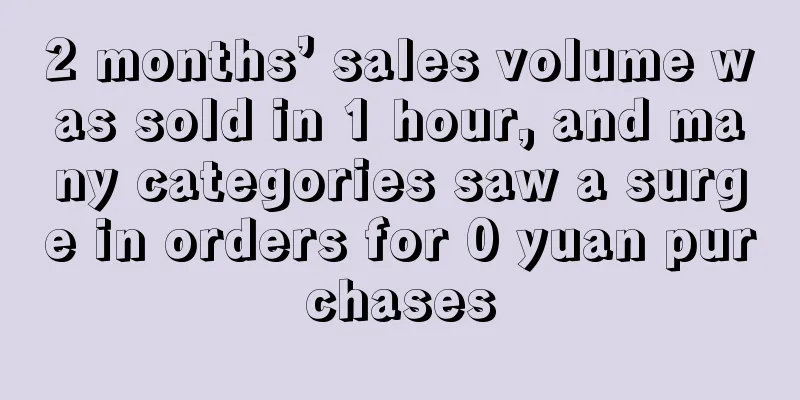2 months’ sales volume was sold in 1 hour, and many categories saw a surge in orders for 0 yuan purchases

|
But this sales surge brought not surprise but shock, because all these orders were completed for 0 yuan, which was called "0 yuan purchase" by the seller. As the products are shipped one after another, who will pay for these losses? Will Amazon bear all the losses alone, or will it ask the sellers to share the losses? Whether the sellers will make a fortune or suffer huge losses depends entirely on the attitude of the platform.
At the same time as this wave of orders, some other sellers received UPC audits from Amazon, and their related links were removed because the UPC codes were not compliant. Sure enough, the reasons for happiness for Amazon sellers are similar, but the reasons for misfortune are different.
There is a surge of 0-yuan purchases in many categories , and the inventory is sold out
Yesterday morning, seller Wang Wei was surprised to find that the number of backend orders was much higher than usual. Thinking of the common discount stacking in the industry, he thought that the new operator had made a mistake in the price, so he immediately checked the discount and revenue, and confirmed that there was nothing abnormal. He breathed a sigh of relief and said, "Fortunately, it was a false alarm."
Wang Wei was not sure about the reason for the surge in sales. The daily sales of his products were low, and the 700-plus stocks were equivalent to two months of sales. But now they were sold out in one day. He guessed that it was because the product link was shared.
Another seller had a similar situation. Between 14:00 and 15:00 PST, 3,000 units of his home furnishings link, which usually had average sales, were directly ordered and were in a pending state. After investigation, no abnormal coupon or discount code settings were found, and no activities were participated in.
The seller immediately realized that something was wrong. His product had no Easter-related attributes, and as an old link, it was unlikely that competitors would place large orders for it in a short period of time. Another possibility was that the order was abnormal due to Amazon's system problems.
This idea was quickly verified. " Amazon seems to have a bug. Just 5 hours ago, a large number of sellers' goods were sold out. When checking out, there was a $20 discount for no apparent reason. At first, I thought it was a sales explosion, but I didn't expect that many of my peers were in the same situation . " said a seller.
According to feedback from sellers, multiple listings in Amazon's garden, home, pets and toys categories unexpectedly exploded in sales without any discounts or flash sales, and a large number of products were cleared out of inventory, but the actual payment amount for these orders was 0 yuan.
For the seller community, this is no less than an earthquake, and all communication groups have been flooded with related news:
"The courtyard category is booming, and all the groups are saying that there has been a sudden surge in orders today." "Is there a bug in the Patio & Garden category today or is it crazy? All the inventory is sold out, and it's still the original price." "A lot of things in the home and garden categories have been cleared out, including several of our products." "I've experienced this, too. It's even more exciting than Black Friday, the conversion rate is surprisingly good, and the orders have increased dozens of times." "In one hour, my 20-30 days' worth of inventory was sold out. Similar situations occurred in many categories. There must be something wrong when something is out of the ordinary."
Many categories were involved. When they first heard about their peers’ surge in orders, many sellers were envious and felt like they had lost 1 million yuan. But after understanding the situation, they couldn’t help but feel lucky that they were not affected. A home furnishing seller said that fortunately his order volume was normal, but on the other hand, he felt sorry for his peers. “If it was Amazon’s own problem, the platform would just not arrange for delivery. If it was delivered normally, the seller would probably lose a lot of money.”
At the Amazon front desk, buyers reacted quickly. After discovering the system loophole, they called on their friends to forward the "special offer" product links and quickly placed orders for shoe racks, carpets, carts and other products. One buyer said that he "only grabbed 27 orders."
(Partial order list of a buyer)
Under this abnormal sales situation, some sellers received 7,000 orders on the same day. A Shenzhen seller told the editor that one of his products received more than a dozen orders a day, and more than 1,000 orders were received within half an hour after the 0 yuan purchase was launched. Currently, the inventory has been cleared, and a small half of the orders have been shipped.
It is hard to judge whether it is a blessing or a curse that a large number of orders are placed under the 0 Yuan purchase. Many sellers are worried about losses caused by this, but some people think in reverse, hoping that there will be such a bug in their category, so that they can clear their inventory without worrying about it. One seller joked: Is there any 0 Yuan purchase bug that can destroy my store? Wait for Amazon to compensate!
Category list reshuffled, some orders have been shipped
Under the powerful interference of 0 yuan purchase, the rankings of products in categories such as gardens have changed beyond recognition.
In the home kitchen category, a large number of products have never been ranked or ranked outside the top 100,000 and have entered the top hundreds or even the top 100 in sales rankings. One curtain has soared from 730,000 to 113, a 6,477-fold increase in ranking;
In the garden category, the sales ranking of a doormat soared from 32,000 to third place, a 10,000-fold increase. In the pet and toy category, there were also large-scale ranking changes, but not as dramatic as the first two categories.
(Garden Category Rising List)
The relevant products were sold out, but compared with the buyers' keenness, Amazon did not respond to this incident in time. As of yesterday afternoon, some of the orders generated had been shipped, and the products were sold out.
So will Amazon hold back other orders waiting to be shipped?
In fact, buyers who are eager to buy are well aware that such orders that exploit system loopholes may not be fully delivered. "This delivery depends on luck, and I don't know whether it will be delivered. Whether the order will be cancelled depends on the warehouse's delivery speed and our area. Generally, the faster the delivery time, the higher the chance of cancellation. The orders that arrive at the end of the month or in May are more likely to be cancelled." said a Chinese buyer.
Most sellers believe that Amazon attaches great importance to buyer experience, and canceling orders that have been shipped will affect Amazon's integrity. Therefore, products that have been shipped will basically not be canceled, but all orders that have not been shipped after placing an order will most likely be canceled.
So who will be held responsible for the losses of the shipped orders? Sellers reported that some of the surge in orders had been successfully paid, and the report showed no abnormalities in the financial data, and the order amounts had been included in the account balance. "I checked the backend and found that the status of many orders had changed, and the payment had been completed and there were no abnormalities in the payment amounts."
Sellers who have been placing orders crazily are reassured, but will Amazon bear all the losses?
Judging from the cause of the incident, the seller did not set up discounts or coupons, nor did he participate in any flash sales, and did not actively lower the price of the product. However, due to Amazon's system problems, a large number of products were exempted from the original price and finally sold at 0 yuan. Amazon is responsible and should be held fully responsible for the incident. This is also the view of most sellers. If Amazon pays for everything, the seller will take this opportunity to successfully sell a large number of products, and the profit will be more considerable than that of Black Friday.
However, considering the actual situation, a large number of products in the four major categories were sold out, and the total amount involved is by no means a small number. The sales of two sellers reached $68,000 and $110,000 respectively, and the full sales amount is hard to imagine. Even if Amazon can stop most of the orders, the orders that have been shipped are still a huge loss.
Therefore, many sellers are worried that Amazon will not pay for all the losses caused by this, and sellers may be forced to bear part of it. One seller pessimistically believes: "Amazon will definitely find a way to make sellers pay, or just send the goods for 0 yuan." If this is the case, the sellers who are sold for 0 yuan will suffer.
It is precisely because of these uncertainties that sellers are anxious after learning about the explosion of orders. As the sellers said, the sellers who have already received orders will either get rich or go bankrupt. The words may be exaggerated, but the impact of this incident on sellers is obvious. Whether the 0 yuan purchase will eventually become good news or bad news for sellers depends entirely on Amazon's attitude. The sellers involved are waiting for Amazon's notification, but as of press time, Amazon has not responded to the 0 yuan purchase incident.
In addition to the question of sales amount, many sellers also think of another question: If a product with 10 orders a day suddenly sells 1,000 orders within an hour, what will Amazon think? Will Amazon suddenly accuse me of "sales surge, ranking manipulation"? Sellers are not without concerns: "There is a risk of being scanned in, and if it is scanned, it will be judged as a sales surge or fraud."
If this is the case, these sellers are really more wronged than Dou E, after all, it is not their intention to have their FBA inventory sold out in seconds. To reduce this risk, sellers can consider opening a case and proactively reporting to customer service to prevent being caught by Amazon and causing accidental injuries.
In addition, if Amazon successfully cancels the undelivered orders, will the listing weight decrease? When buyers are frantically buying, many people buy multiple copies of the same product at one time. Will they return the products later? These returns will also cause considerable trouble and harm to sellers.
The 0 Yuan purchase news caused a stir among Amazon sellers. It is difficult to sum up the pros and cons of this surge in orders for sellers. As one seller said, "A gradual surge in orders is what we need. This kind of abnormal clearance of inventory, even if all the inventory is really sold, a long period of out of stock will also hurt the reputation." If the listing is removed from the shelves as a result, it will be a greater blow to the seller.
On the same day when the surge in orders occurred, some sellers' listings also had problems, and the reason was the UPC code. Currently, some sellers' listings have been directly removed from Amazon due to UPC non-compliance. Sellers who have not been affected are also starting to get nervous. They are well aware that they have UPC non-compliance issues. If the platform continues to conduct strict inspections, a large number of sellers will face the risk of having their listings removed.
Amazon strictly checks UPC , and a large number of listings are removed
Recently, Amazon sellers have reported a lot of issues with store listings being removed from the shelves. Some sellers had dozens or even hundreds of listings removed from the shelves at the same time . The sellers were suddenly panicked, and tension has been spreading.
One seller said that he discovered early in the morning that all of the company’s more than a dozen listings in the US and European stores had gone dark, with all of them showing: the detail page had been deleted , there were no emails, no performance notifications, follow-selling was not possible, and the comments were gone.
The seller consulted customer service and received the following reply: The product details page was deleted because the GTIN (UPC/EAN) used did not match/was invalid with the product information; please make sure that you are using a valid GTIN and provide valid documentation before we can further process your case.
The seller's situation is not an isolated case. Many people have fallen victim to UPC issues.
An industry insider reported that Amazon has recently been looking into past issues, and many sellers’ products have been removed from the shelves due to UPC non-compliance. Most of the time, the sellers did not receive an email after the products were removed, and only then did they figure out the problem. The insider reminded sellers that if someone’s product has been removed from the shelves recently and they don’t know why, they can directly contact customer service to see if it is due to UPC issues.
Many of the sellers’ listings were directly deleted. Some sellers had their old products that they had been selling for several years deleted, resulting in considerable losses. There were also sellers whose dozens of listings were deleted at the same time, although there were still goods in the warehouse and the goods to be shipped were still on the way, but the listings became unavailable!
Many of these sellers did not know what platform rules they had violated. After their links were deleted, they discovered through Amazon customer service or communication with their peers that their products were affected by the platform’s strict UPC checks.
Compared with the sellers whose listings were deleted inexplicably, another group of people were clearly arranged by the platform. They received emails from Amazon.
The general content of the email is: Amazon requires a valid Global Trade Item Number (GTIN) in all product listings . The quality team has detected that some of your products use invalid GTINs, which have been listed on the "Fix Your Products" page. If the GTIN is not sold by GS1 or is not recognized by the brand owner, it is considered invalid. You must take immediate action to deal with these listings, otherwise they will be deleted.
Of course, there are also many sellers who have received emails. Regardless of whether they have received the email or not, it is certain that Amazon is strictly checking UPCs. If the UPC does not match the product or is not provided by GS1, the seller’s listing may be at risk of being removed from the shelves.
Because of the previous experience, the listings of the affected sellers have been removed due to non-compliant UPCs, so the sellers who have received the emails are terrified, fearing that they will be affected. Some sellers who have not received the emails have also become nervous, because some of them clearly know that their UPCs and products do not match.
There are many non-compliant UPCs, and sellers are beginning to get nervous
It is understood that many sellers in the industry have irregular UPCs, which they generally obtain through two ways: 1. Generating them on a certain website; 2. Purchasing them through Taobao. One seller said frankly, "I bought them through Taobao, 30 cents each."
Another seller with inside information said: "If you buy a regular UPC code, it shouldn't be a problem, but it seems that the UPC is sold repeatedly to multiple buyers by the same seller, or if you buy a generated UPC code, this won't work."
Well-known people said that everyone is the same. Many sellers did not pay attention to this problem before and now regret it. If the platform conducts random checks, a large number of sellers will suffer.
Seller D regretted: "Who could have predicted this? Now I don't know whether to ship it or not." Seller C seemed very nervous: "Now the UPC of the old main product has problems. Do I have to create a new link to promote it?"
These sellers believe that the most urgent task is to gradually transfer those products listed with non-compliant UPCs to safe links. Otherwise, the UPC issue is a mine that can explode at any time. Because the affected area is wide, the sellers will be affected to a great extent. Some old sellers bluntly said that the power of this mine may be no less than that of account suspension.
In order to solve the problem, some sellers are currently applying for exemptions, but the relevant operation is not easy.
According to the email from Amazon, sellers need to submit a letter of authorization or license agreement that meets the following conditions in order to repair the listing:
• The name and address of the brand rights owner; • The content must be clear; • Manufacturer name and contact information; • The seller’s legal company name or seller name corresponding to your Account Information page in Seller Central; • The seller’s physical address; • Must be in English; • GS1 Certificate, we recommend obtaining the GTIN directly from GS1 (rather than from other third parties who sell GTIN licenses) to ensure that the appropriate information is reflected in the GS1 database.
Importantly, if sellers do not take UPC issues seriously, fail to provide the requested information and fix risky listings by the deadlines set by Amazon, then their products will be removed.
At present, sellers have already encountered the problem of listing being removed from the shelves, and there are also problems that they will soon face.
According to Amazon's response, this is because the ASIN's Global Trade Item Code does not match the brand associated with the ASIN. The Global Trade Item Code is a reliable data used to limit duplicate products in the catalog and ensure the authenticity of products. We will verify the authenticity of the Global Trade Item Code by checking the GS1 database. Global Trade Item Codes that do not match the information in GS1 will be considered invalid.
For sellers who use invalid UPC codes, can they just wait for the time bomb to explode?
Some industry insiders expressed frustration: "This is an unsolvable problem at present. A friend of mine has also encountered it. Thousands of goods are being transferred to warehouses. It's a pity that the links are wasted. Fortunately, I found an overseas warehouse and negotiated a more favorable price."
Some sellers have the same understanding. They know that the current UPC problem may have no solution, and all they can do is move warehouses and change labels to minimize losses.
In fact, this is not the first time that Amazon has strictly checked UPC non-compliance issues. About two months ago, Amazon conducted a random inspection. At that time, when a seller was editing an old link, a message "the value exceeds the maximum length" appeared at the product code on the page. Amazon prompted that it would check the validity of the product code based on the relevant database. If the product code is not registered in GS1, its associated ASIN will be prohibited from display, and the seller's product creation permission may be revoked.
At that time, many sellers who purchased UPC through Taobao were affected. Some sellers had been selling for several years and had accumulated thousands of reviews, but their products were taken off the shelves. Some sellers had hundreds of listings affected.
I would like to advise all sellers, especially new sellers, to apply for brand exemptions and stop using randomly generated or purchased non-compliant UPCs, or you will regret it when the scandal breaks out.
In fact, whether it is the UPC problem, or the previous problems of fake orders and fake reviews, it is certain that the Amazon platform has always had the style of settling accounts after the event. Sellers who have done non-compliant operations in the early stage in order to save money, increase orders, and maximize profits are at risk of being caught later. Moreover, this type of problem has not occurred only once, and sellers should pay attention to it.
Amazon 0 yuan purchase |
>>: As logistics costs continue to rise, some companies have set up their own shipping companies
Recommend
15 SEO Statistics for Sellers
SEO stands for Search Engine Optimization, which ...
Amazon seller committed crimes crazily in 7 years and made more than 1.3 million US dollars in profits!
Recently, a seller on Amazon’s US site was senten...
Social e-commerce has a bright future, and the market is expected to reach 2.9 trillion US dollars in 2026!
Social commerce refers to e-commerce companies us...
"0 Yuan Shopping" Reappears on the Eve of Prime Day! Amazon: Cancelling Abnormal Orders
Recently, some sellers reported that orders sudde...
What is Fuming erp? Fuming erp Review, Features
Fuming ERP creates professional systems for custom...
Another group of people are changing careers! Where did the resigned operations staff go?
Should we maintain the status quo or leave our co...
Due to tight funds, Shenzhen Dama issued an "asset-to-debt agreement"
Not long ago, a major seller in Shenzhen informed...
What to do when you encounter negative reviews? Here are some tips!
In crisis public relations, 24 hours is a golden ...
What is Mango Overseas Warehouse? Mango Overseas Warehouse Review, Features
Mango Overseas Warehouse (Ginkgo Tree E-Commerce C...
Is it going to be a failure? All the properties of Shenzhen Dama were seized...
Will Global Easy Shopping eventually be unable to...
What is Riyu Logistics? Riyu Logistics Review, Features
Founded in 1999, Riyu Logistics is an AAAA-level ...
What is Preloved? Preloved Review, Features
Preloved was founded in 1995 by Julia Grieve and i...
What is Yibang Logistics? Yibang Logistics Review, Features
Yibang Logistics (Yibang (Shenzhen) International ...
What is lotte super? lotte super Review, Features
lotte super operates stores with various concepts ...
Consumer in-app spending grew 40% in Q1 2021
App Annie's survey results show that smartpho...









